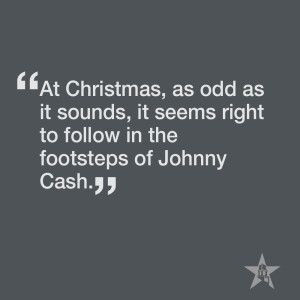
I love Johnny Cash. Yes, I said love. Not like, not appreciate, not admire. Now that that is solidified, onward. Around Advent, my favorite song is “I Heard the Bells on Christmas Day,” and particularly the version sung by the aforementioned star of country western. This is adapted from a poem by Henry Wadsworth Longfellow called “Christmas Bells.” In the piece, Longfellow muses on the centuries-long tradition of the church proclaiming peace in contradiction to Christmas in the midst of the American Civil War. He laments; “and in despair I bowed my head; ‘There is no peace on earth,” I said; “For hate is strong, and mocks the song of peace on earth, good-will to men!’”
How did Longfellow resolve this? He trusted that the witness of peace, even amidst war, would ultimately prevail, although in 1863 he could not see peace immediately. “Then pealed the bells more loud and deep: ‘God is not dead, nor doth He sleep; the Wrong shall fail, the Right prevail, with peace on earth, good-will to men.’” Symbolically, bells entail resurrection, celebration, and the marking of occasions.
What are we to do in the tensions of life? War and peace. Refugees and comfortable American suburbanites. Historical witness and present reality. Especially in Christmas, there is the age-old temptation to suspend reality and exist in a sugar-coated bubble. Turn on “Frosty the Snowman,” decorate a fake tree, spray pine perfume on it, veg out on frosted cookies, exchange gifts churned out in the factory of big box stores and materialism, and call it a night.
I really don’t like Christmas music. The music that fits at Christmas time are the songs that get at this tension. These are the songs that are honest about the disjunctions of life, “Come Thou Long Expected Jesus,” “I Heard the Bells On Christmas Day,” and “O Come, O Come, Emmanuel.” These songs admit that there is a gap between the hopes of Christmas, and the present reality. Although we celebrate, we recognize that peace is not normative, and must continue to be hoped for, even 2,000 years plus down the line.
 We celebrate that Christ has come, yet in the same story Herod is slaughtering the innocents, and the holy family flees to Egypt as refugees. There is an expectation of peace, and an “already but not yet” tension. How can we celebrate Christmas, yet witness in faithfulness that acknowledges the tension?
We celebrate that Christ has come, yet in the same story Herod is slaughtering the innocents, and the holy family flees to Egypt as refugees. There is an expectation of peace, and an “already but not yet” tension. How can we celebrate Christmas, yet witness in faithfulness that acknowledges the tension?
For the sake of the full circle, back to Johnny Cash. My favorite song of his is “Man in Black”. Here, he describes the purpose of his wardrobe. He consistently wore black, and if you listen to them right, most of his songs were preacher-songs, describing the pain and the ups and downs of human life. He wore black to identify with the “beaten down,” amidst the current culture of “streak of lightnin’ cars and fancy clothes,” reasoning that “I’d love to wear a rainbow every day, and tell the world that everything’s OK, but I’ll try to carry off a little darkness on my back,
’till things are brighter, I’m the Man In Black.”
At Christmas, as odd as it sounds, it seems right to follow in the footsteps of Johnny Cash.
Joanna is a senior theology major.
